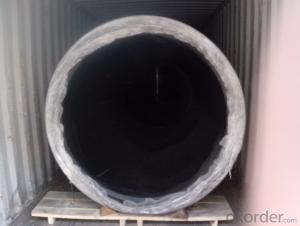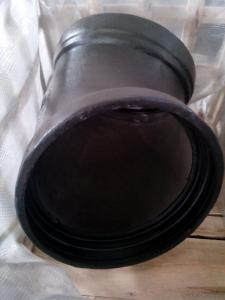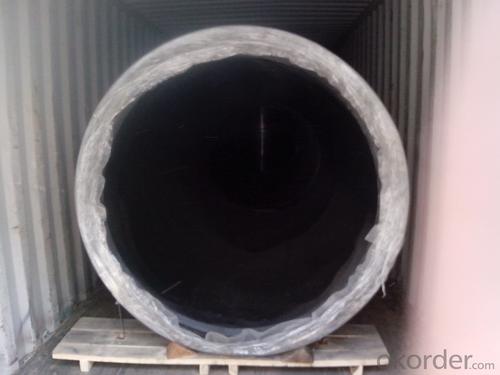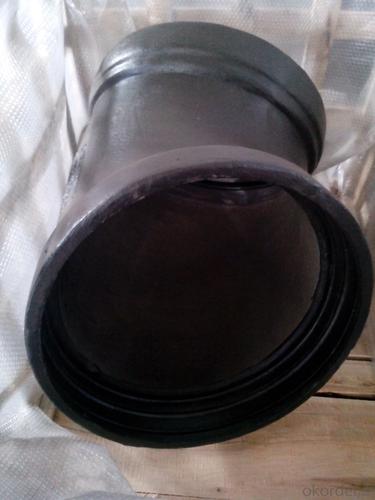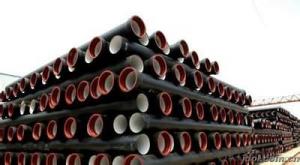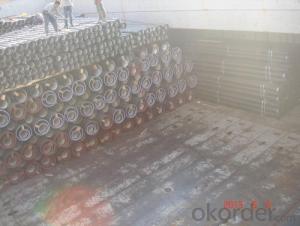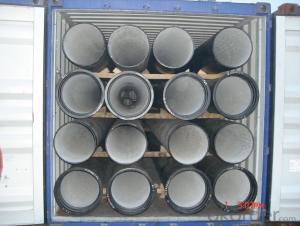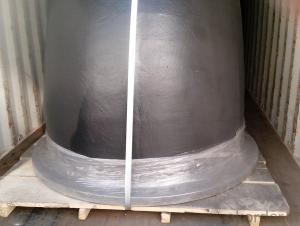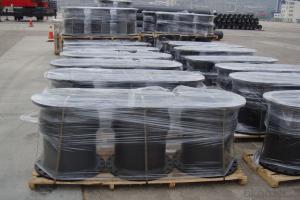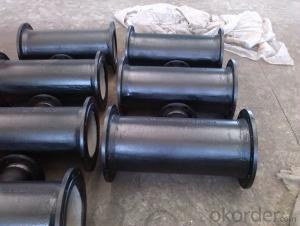DUCTILE IRON PIPE C Class DN 1200
- Loading Port:
- Tianjin
- Payment Terms:
- TT OR LC
- Min Order Qty:
- -
- Supply Capability:
- 30000Tons m/month
OKorder Service Pledge
OKorder Financial Service
You Might Also Like
CNBM ductile iron pipe ranges from DN80-DN1600mm (T-Type, Class K9), effective length 6m, comply with ISO2531 Standard
Company Profile
CNBM International Corporation is the leading production base and renowned supplier of Ductile Iron Water Pipe systems of both potable and waste water in China. We are constantly looking to develop high quality products to ensure the longest service life and wonderful performance.
CNBM Pipelines regard quality as the essential factor leading to successful business. Every pipe is tested in accordance with BS EN545 (water application) or BS EN598 (sewer application). CNBM Pipelines products comply with and are tested according to the relevant European and International Standards. Our pipes are manufactured under the quality management system BS EN ISO 9001. After years of efforts, CNBM Pipelines has built up great reputation in terms of quality and service among customers worldwide
Product Introduction
CNBM ductile iron pipe ranges from DN80-DN1600mm (Tyton, T-Type, Class K7/K8/K9), effective length: 6m, complying with BS EN545/EN598/ISO2531/BS4772.
Specification& Payment terms
Internal lining: Pipes shall have an internal cement mortar lining in acc with ISO4179.
External coating: Pipes shall be externally coated with metallic zinc spray plus a further layer of resin painting to ISO8179.
Gasket: 100% SBR/NBR/EPDM gasket in accordance with ISO4633.
Packing: Pipes from DN100 to DN300 be bundled with steel belts, the others are in bulk.
Payment term: By 30% T/T advance payment + 70% Irrevocable L/C at sight.
Packing: In bulk vessel or in container.
- Q: What are the different joint restraint systems available for ductile iron pipe?
- Some of the different joint restraint systems available for ductile iron pipe include mechanical joint restraints, push-on joint restraints, and restrained joint systems.
- Q: What is the lifespan of ductile iron pipe?
- The lifespan of ductile iron pipe can vary depending on various factors such as the quality of the pipe, the environment in which it is installed, and the maintenance practices followed. However, on average, ductile iron pipe has a lifespan of around 80 to 100 years. This long lifespan can be attributed to the inherent durability and strength of ductile iron, which allows it to withstand high pressure, external loads, and environmental conditions. Additionally, ductile iron pipe is often coated with protective linings such as cement mortar or epoxy to further enhance its resistance to corrosion and extend its lifespan. Regular inspections and maintenance can also contribute to prolonging the lifespan of ductile iron pipe by identifying and addressing any potential issues in a timely manner. Ultimately, with proper installation, maintenance, and care, ductile iron pipe can provide reliable and long-lasting service for several decades.
- Q: Can ductile iron pipes be used in areas with high levels of hydrogen sulfide gas?
- Yes, ductile iron pipes can be used in areas with high levels of hydrogen sulfide gas. Ductile iron pipes have a high corrosion resistance, which makes them suitable for such environments. Additionally, they have been successfully used in sewage systems and wastewater treatment plants where hydrogen sulfide gas is commonly present.
- Q: Can ductile iron pipes be used for irrigation systems?
- Yes, ductile iron pipes can be used for irrigation systems. Ductile iron pipes are commonly used in various applications, including water supply systems and irrigation systems. They are known for their strength, durability, and corrosion resistance, making them suitable for transporting water in irrigation systems.
- Q: Comparison of ductile iron pipe and spiral steel pipe
- Ball milling cast iron pipe: corrosion resistance, high compressive strength, cheap, non pressure, socket connection.
- Q: What are the different pressure ratings available for ductile iron pipe?
- The pressure ratings available for ductile iron pipe typically range from 150 psi to 350 psi, depending on the size and application of the pipe.
- Q: What are the different corrosion protection options for ductile iron pipe?
- There are several corrosion protection options available for ductile iron pipe to ensure its longevity and durability. These options include: 1. Cement Mortar Lining: This involves coating the inner surface of the pipe with a layer of cement mortar, which acts as a barrier between the pipe and corrosive elements in the water or soil. Cement mortar lining provides excellent corrosion resistance and can last for several decades. 2. Polyethylene Encasement: This method involves wrapping the ductile iron pipe with a layer of polyethylene material. The polyethylene acts as a physical barrier, protecting the pipe from external corrosive elements. Polyethylene encasement is commonly used in aggressive soil conditions and can offer long-lasting protection. 3. Internal and External Coatings: Various types of coatings can be applied to the inner and outer surfaces of the ductile iron pipe to provide corrosion resistance. These coatings can be epoxy, polyurethane, or fusion-bonded epoxy (FBE) coatings. These coatings create a barrier between the pipe and the surrounding environment, preventing corrosion. 4. Cathodic Protection: This method involves using an electrical current to protect the pipe from corrosion. Cathodic protection systems can be either galvanic (sacrificial anode) or impressed current systems. These systems direct the flow of electrons to prevent the oxidation of the ductile iron pipe. 5. Zinc Coating: Zinc coating, also known as galvanizing, involves applying a layer of zinc to the surface of the ductile iron pipe. The zinc acts as a sacrificial anode, corroding instead of the iron pipe. Zinc coating provides effective corrosion protection, particularly in soil conditions with low resistivity. It's important to note that the choice of corrosion protection option for ductile iron pipes depends on various factors such as the environment, water chemistry, soil conditions, and expected service life. Consulting with corrosion protection specialists and engineers can help in selecting the most suitable option for specific applications.
- Q: If the ductile iron pipe is broken, can we use rush repair?
- PE pipe repair section, as the name suggests, is a kind of used to repair the pipeline accessories. At present, the specifications of the repair section are: Phi 90, Phi 110, Phi 125, Phi 160, Phi 200, Phi 225, Phi 250, Phi 315 these specifications.
- Q: Can ductile iron pipes be used in areas with high soil acidity and alkalinity?
- Ductile iron pipes can generally be used in areas with high soil acidity and alkalinity. However, it is important to consider the specific conditions and take appropriate measures to mitigate the potential effects of these soil characteristics on the pipes. In areas with high soil acidity, the acidic conditions can promote corrosion of metal pipes, including ductile iron. To prevent this, protective measures such as applying an external coating or using cathodic protection can be implemented. These measures help to create a barrier between the pipe and the corrosive environment, extending the longevity of the pipes. Similarly, in areas with high soil alkalinity, the alkaline conditions can also have an impact on the performance of ductile iron pipes. Alkaline soils can cause the formation of calcium carbonate deposits, commonly known as scale, which can reduce the flow capacity of the pipes over time. Regular maintenance and cleaning of the pipes can help mitigate the effects of scale buildup. It is worth noting that the suitability of ductile iron pipes in areas with high soil acidity and alkalinity may also depend on the specific grade and quality of the pipes. Manufacturers often provide guidelines and recommendations regarding the use of their products in various environmental conditions. It is advisable to consult with pipe manufacturers or industry experts to ensure proper selection and installation of ductile iron pipes in such areas.
- Q: How are ductile iron pipes protected against erosion caused by high-velocity flow?
- Ductile iron pipes are protected against erosion caused by high-velocity flow through various methods and techniques. One common method is the application of protective coatings on the inner surface of the pipes. These coatings create a barrier between the flowing water and the pipe material, reducing the abrasive effects of the high-velocity flow. The coatings used may include epoxy, polyurethane, or cement-mortar lining, depending on the specific requirements of the application. Additionally, manufacturers often design the pipes with increased wall thickness in areas that are prone to erosion, such as bends or areas where the flow velocity is highest. This extra thickness provides additional strength and resistance against erosion. Another technique used to protect ductile iron pipes from erosion is the implementation of flow control devices, such as flow deflectors or velocity-reducing fittings. These devices help to redirect the flow and reduce its velocity, thereby minimizing the impact on the pipe walls. Regular maintenance and inspections are also crucial in preventing erosion. By monitoring the condition of the pipes and identifying any signs of erosion early on, appropriate measures can be taken to address the issue before it escalates. This may involve repairing or replacing damaged sections of the pipes, as well as implementing erosion control measures such as sediment filters or flow restrictors. Overall, a combination of protective coatings, design considerations, flow control devices, and proactive maintenance strategies are employed to ensure that ductile iron pipes are adequately protected against erosion caused by high-velocity flow.
Send your message to us
DUCTILE IRON PIPE C Class DN 1200
- Loading Port:
- Tianjin
- Payment Terms:
- TT OR LC
- Min Order Qty:
- -
- Supply Capability:
- 30000Tons m/month
OKorder Service Pledge
OKorder Financial Service
Similar products
Hot products
Hot Searches
Related keywords
